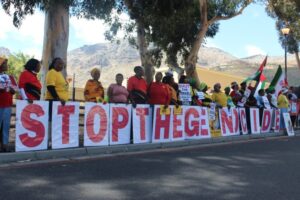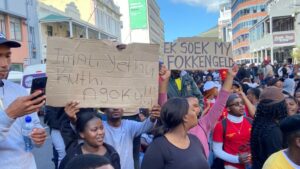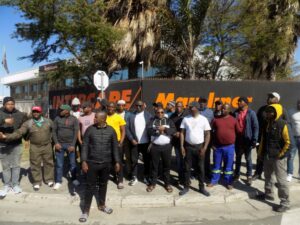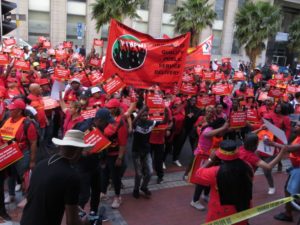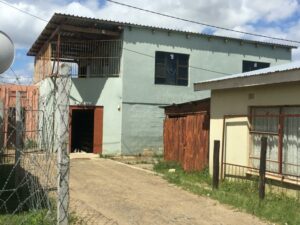Investigation findings released by the South African Human Rights Commission (SAHRC) in June this year found that the Anglo-American Platinum mine in Mogalakwena Municipality is violating the human rights of residents in surrounding villages. Some of these violations include harming their right to water and sanitation, health, and education.
The investigation was conducted after several complaints received by the commission from community members over years, as this has been an ongoing problem that has worsened with time. What the SAHRC sought to establish was the extent of the human rights violations due to mining activities, the causes of the violations experienced by the communities, and whether the mining houses are responsible for these violations.
Mine’s disregard the quality
of life for the people
In an interview with Elitsha, provincial communication manager for the SAHRC, Victor Mavhidula said that one of the most concerning observations of mines in Limpopo is that they have no regard for the impact that their operations have on the quality of life for the people. “Most mining companies in Limpopo are causing destruction to communities because they are mining right in the centre of communities. Learners are often affected because they have to leave early due to the blasting of the mine. People’s houses are falling apart because of this,” he said.
Ga-Molekana is one of the villages close to an Anglo-American mine. Elitsha took a walk around the home of Caroline Moseneke (42) who said she is afraid that one day she will have to evacuate her home with her children because of the blasting that takes place nearby.
The homes of Caroline Moseneke and other community members of Ga-Molekana are on the left, separated by a gravel road from the perimeter fence around the mine. Residents claim that this fencing was erected only recently after their complaints.
Moseneke pointed to the ground to show white map-like traces of powder that she said was left from the contaminated water running through her yard. This powder was also visible in the drums of water (below) that are kept outside.
As she led us through the door of her home, Moseneke indicated the sand on the floors, and the dust covering the pieces of furniture like her room divider and ornaments in the lounge. And right behind her home, hovering over the roof like a dark cloud, is the mine tailings dam made up of sand and rocks, only a stone’s throw from her living room.
Moseneke has lived in Ga-Molekana with her husband and two children for 7 years. Like many other households in the village, her family relies on the child support grant they receive as one of their main sources of income to survive. “They [the mine] once called a community meeting to inform us on what to do when there is an emergency evacuation due to blasting. Why would they do this if there was no possibility that it could harm us?” asked Moseneke.
Moseneke’s home with cracked walls.
Moseneke said that the dust that comes from the mine covers all the surfaces in the house within minutes of cleaning and mopping, while the water that comes out of the tap has white chemical-like contaminants. She spoke with concern about her 7-year-old child that has been in and out of the clinic because of a long lasting cough. “My child’s clinic book is full. Multiple doctors told me that she has asthma and problems with her lungs. When I told the doctor that we stay near the mine, he told me that I need to do further tests on my child. We cannot afford it.”
‘Pollution from the mine
contaminates the water’
The water that residents claim is contaminated streams down to the village from the Blinkwater tailings dam. Residents say that the contaminants from the mine pollute the water to the extent that it is unusable for any household purposes or for residents and livestock to consume.
Elvis Malukela (35) said that he lives 6 metres away from the dam. He has lived in his house for 11 years. Malukela said that he was recently diagnosed with TB at the Valkop Clinic. It was difficult for him to accept this diagnosis for a very long time. “I could not believe it. I travelled to Polokwane to see another doctor, who confirmed that I have TB. I don’t have the money to travel back and forth, and sometimes the clinic does not have the medicine that they should for me,” he said. Polokwane, the nearest city to the village is far away.
Malukela is one of many other community members who said that they are sick with various ailments due to the mine. “The water that we drink is dirty. The mine told us that they won’t blast the dam but we don’t believe them because they said the same thing about Jagersfontein, and we watched the blasting taking place. We are afraid,” he said.
One of the many dead animals that we saw when walking around the community. Many suspect that the random deaths of animals is because of the water that they drink from the dam.
Anglo washes its hands
Anglo American have responded to SAHRC’s investigation with written answers to the queries raised by the commission and community members on 9 July 2024. “The matters canvassed by the SAHRC included enquiries into water. Our regular independent scientific testing indicates that treated water is well in line with the required health and safety standards. Critically, no findings have yet been made. Anglo American Platinum continues to comply fully with the SAHRC’s process and understands the importance and sanctity of their effort,” reads their response.
Acting head of communications at Anglo-American, Keitumetse Masike did not respond to questions that we asked about remedies for cracked homes due to blasting, contaminated water, and the health impacts that community members are enduring.
Although the SAHRC acknowledges the experiences of communities, the recommendations of the SAHRC will not bind the mining company to take any action. “We believe that with the intervention we had in the investigation, the problem can be addressed. We are going to develop the report with recommendations and share it with attendees of the hearing. As the human rights commission we want to see mining companies respecting communities, providing jobs, and working with them and not violating their rights,” the commission’s spokesperson concluded.
